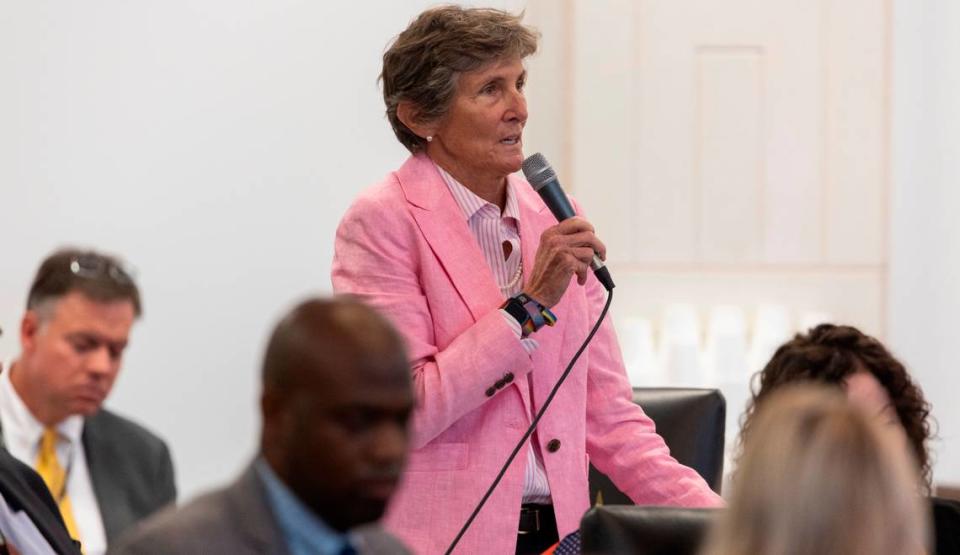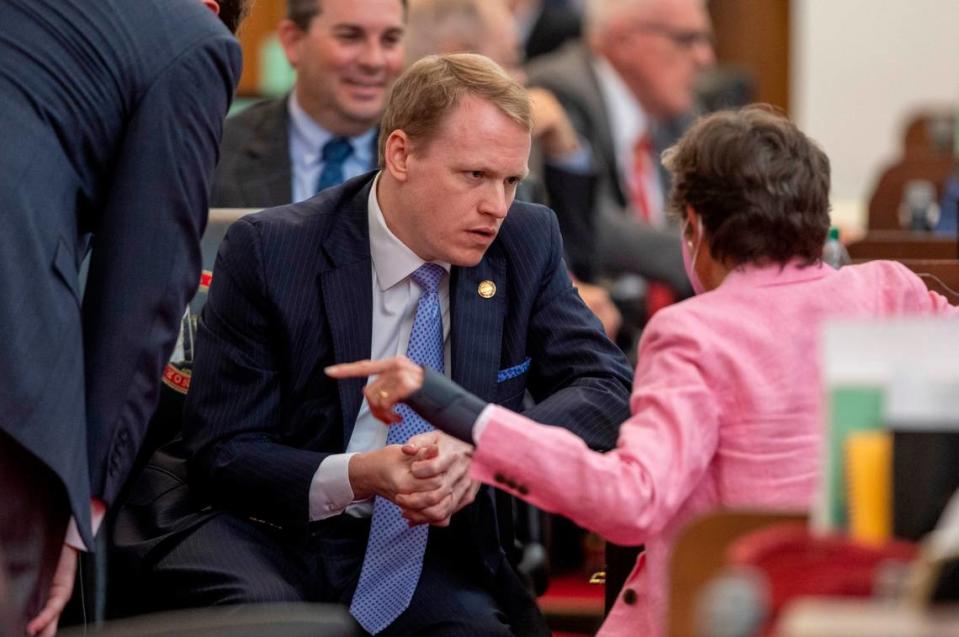House GOP approves bill to overhaul election boards and strip governor of appointments
State House Republicans approved a drastic restructuring of election boards on Tuesday, voting to give more power to the legislature and strip it from Democratic Gov. Roy Cooper.
Cooper has said he will veto the legislation, but Republicans have the numbers to override the governor’s veto and have done so more than a dozen times this session.
Senate Bill 749, which has already passed the Senate in a different form, now returns there. If it passes, the bill would require state and local election boards to have an even bipartisan split and have all members be appointed by the legislature. Currently, these boards are structured to have a 3-2 majority of the governor’s party.
“We all agree that we want elections to be fairly decided,” said Rep. Destin Hall, the House rules chairman. “We don’t want folks to look at it and think that fraud occurred or something improper occurred,”
“But it’s not hard to see how folks might think that there are problems in our elections when the very entity that’s overseeing those has a partisan lean. This bill takes that partisan lean out of it,” said Hall, a Caldwell County Republican.
An even split raises the specter of potential tie votes on important decisions like election certification or early voting plans, none of which are addressed in the bill.
Rep. Pricey Harrison, a Guilford County Democrat, attempted unsuccessfully to pass various amendments addressing deadlocks. One would have allowed county boards that can’t decide on an early voting plan to “default back to the previous similar election to go by that early voting schedule.”

Asked by Rep. Abe Jones, a Wake County Democrat, what would happen under a deadlock, Hall said: “When there’s a deadlock, nothing happens. Whatever the issue is before — just like before this body — if it’s a tie, there’s no affirmative action.”
Cooper suggested the bill would be used to remove Karen Brinson Bell, the current executive director of the State Board of Elections.
“I’m concerned about them creating chaos in the administration of our elections by putting a board in place that is designed to create gridlock,” he told reporters this month. “And then you take away an executive director who has experience as we’re going up to one of the most important elections in our state and country’s history — that clearly is going to cause significant problems.”
A provision of the bill allows the legislature to select a board’s executive director if the board cannot reach a decision within 30 days, but any other tie decisions are left without a specified remedy.
The State Board of Elections would be relocated to the secretary of state’s office under this bill. Rep Marcia Morey, a Durham County Democrat, attempted and failed to pass an amendment Tuesday to block this change. Secretary of State Elaine Marshall, a Democrat, has argued that the office was already severely underfunded and would suffer under the extra workload.
“The proposed transfer will disrupt years of progress by our office and the many enhancements we’ve made that enable our business community to be highly competitive,” Marshall said.
Hall said the state board would still be responsible for conducting elections and the relocation is purely administrative.
“If it’s an issue with the secretary of state, I’m certainly committed to trying to resolve those issues later on when we find out what those needs actually are,” Hall said Tuesday.
Republicans proposed a similar plan as a constitutional amendment in 2018, but over 61% of voters rejected it.
Set to pass weeks ago, but pulled as opposition mounted
The House was set to pass the bill Sept. 5, but ended up pulling it from the calendar as protesters descended on the legislative building.
Hall told The News & Observer that the bill was pulled for scheduling reasons, given that it would take a few hours to get the bill to the floor.

Supporters of the bill say the new structure encourages bipartisanship, but have offered few specifics on how deadlocks would be handled.
“If they don’t reach an agreement, then it may be an issue where it’s a partisan-leaning issue,” Hall said. “If they’re able to come to an agreement and at least get one person from the other party — that’s bipartisanship and these issues, being as important as they are to be decided, ought to be decided that way.”
At a press conference denouncing the bill earlier this month, critics charged that deadlocks could cause chaos if election boards are unable to agree on certifying election results or approving early voting plans. Current law states that if a county election board cannot decide on an early voting plan, then the local board of elections office becomes the only early voting site in the county.
Ann Webb, policy director for Common Cause NC, noted that over 350,000 people in Mecklenburg County used early voting in the 2020 election.
“They have one county board of elections office with, by my estimate, less than 50 parking spots,” she said at the press conference. “How would that work? What would that look like in an election like the 2024 presidential election? It would be a disaster. And there would be every incentive for partisan gridlock to cause that kind of disaster.”
Failure to reach an agreement on early voting by a county board is kicked up to the State Board of Elections, but under the new makeup, that board could reach a tie vote as well.
Asked about tie votes in June, Senate leader Phil Berger told reporters he suspected the decision would then go to a superior court.
More election changes in store
This isn’t the only major elections bill to go through the General Assembly this session.
Last month, Republicans passed a sweeping set of election changes in Senate Bill 747. Cooper vetoed the bill shortly after, calling it an “assault on the right to vote.” Republicans are expected to try to pass the bill over Cooper’s objections.
The bill would eliminate the three-day post-election grace period for receiving absentee ballots, empower partisan poll observers to watch voting spaces, ban most private money for election administration and more.
Republicans argue the changes would increase faith in elections, but Democrats said the changes would make it easier to throw out valid votes and potentially lead to intimidation at the ballot box.
The changes also come as the new voter ID requirement goes into effect in municipal elections across the state.
In April, the state Supreme Court’s new Republican majority ruled that a voter ID law could go into effect, reversing an earlier decision in which the court struck down the law.
House Republicans also passed a bill on Tuesday to make more voting information a public record. The bill, House Bill 770, would allow the public to obtain voting records from all elections that would be stripped of identifying information. Legislators said the records would not make it possible to see how a certain person voted.
The bill passed 73 to 29, with some Democrats voting in favor. That included Harrison, who said she was in support of the bill following some changes but that she hoped more work would be done on it, including to address privacy concerns in small precincts.
Capitol Bureau Chief Dawn Baumgartner Vaughan contributed to this report.

